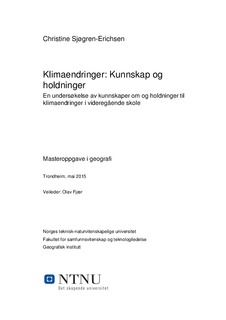| dc.description.abstract | This master thesis deals with the knowledge and attitude towards climate change among students in Norwegian secondary school. In a survey, 207 students at first, second and third level in secondary school answered questions concerning climate change. The survey was split in two main parts, where the first was about knowledge, while the second was about attitude. All in all, the results attempt to answer the three problems of the survey, i.e.: (1) What knowledge do the students have regarding climate change and possible consequences for Norway?, (2) What are the students’ attitudes towards climate change and climate mitigation?, and (3) Do the students’ sex or line of study have any impact on the answers given, and do the students’ level of knowledge influence their attitude to climate change and climate mitigation?
Climate change is a topical subject, both in research and in the media. The thematics are present in various curriculums for some subjects in school, but is not mentioned explicitly in any of them. It is therefore interesting to examine what the students know and how they relate to climate change. Principally, the survey has been made up by tick-off questions, but on some topics the students could write freely.
This essay shows that many students know much about climate change, as around 70% answer correctly on questions about the greenhouse effect and consequences of global warming. Sustainable development is a concept the students show particular knowledge of, and may be related to its presence in the various curriculums. In general, the students are positive to climate mitigation, and think Norway should contribute in order to reduce climate changes. Yet, only a few of them emphasize environmental aspects in connection with their own domestic choices. The answers reveal that they learn most about climate change from TV programs, with school coming second. Different answers dependent of sex and line of study have been found; in particular these differences are significant regarding choices of transport. It is also evident that the students with the least knowledge of climate changes, also tend to be most skeptical to
climate mitigation. | nb_NO |
